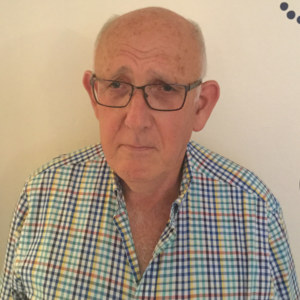-
Depression and Liberation, a Continuing Journey

-
In support of our Men’s Wellbeing Matters campaign, our Vice-Chair of Trustees, Jeremy Ross, looks back on his life affected by depression, how it held him back but also gave him the key to transform his life. He shares the discoveries he has made along the way and how he has and continues to build resilience.
“My name is Jeremy Ross and I am a Trustee of Mary Frances Trust. What draws me to support MFT is its honesty about the fragility of our mental health, with most people having at least one episode of mild to moderate mental health difficulty during their life.
I want to be honest about my depression, how it held me back, yet provided the key to transform my life. Dorothy Rowe was an Australian clinical psychologist and psychotherapist who wrote the book Depression. In it, she described what depression means, using the lived experience of those who have experienced it.
Dorothy writes directly, avoiding clinical, theoretical language. She describes depression as a form of social and psychological imprisonment. Coping with depression is about the personal journey involved in finding one’s own key. This means finding liberation from an imprisonment that is a continuing process involving building understanding of self and our varying context, thus acquiring resilience.
My early family experience was difficult. My father thought that I was stupid and would never amount to anything. My mother was always open and accepting. When she died, my world, centred around her love, began to collapse. As in all families, all this is composed of layers of personal experience, individual meaning, confusion and heard as well as unheard messages.
I took an overdose and ended up in accident and emergency. After 9 months in day hospital, my transformation began. I was lucky to have a good clinical psychologist who helped me to map and understand my childhood.
I then spent a year in a residential therapeutic community. Here I began to learn to cope with living with others, dealing with the conflict arising in living in a community. For example, cleaning, cooking, washing up was a cause of conflict when one person did not do their tasks. I had individual counselling sessions and attended twice weekly community meetings.
The therapeutic community and psychotherapy allowed me to understand my family. I began to gain confidence to make friends and express myself. However, this was in the contained world of the clinical sessions and community. The next stage was to transfer and extend the knowledge and confidence to the wider ‘real’ world.
My psychiatrist was active in [mental health charity] Mind. She suggested that I do a voluntary research placement in the policy department. I worked on the policy issues arising as a result of the reform of the 1959 Mental Health Act as well as models of community care. I delivered lectures to university students and professionals. I experienced people who valued my intelligence, insight and experience.
At the same time, I worked at the visitors centre at Pentonville Prison, supporting the families of prisoners, helping them access housing, benefits and employment advice. It was Mind directors and the prison Senior probation officer who suggested that I explore a career as a social worker, something that I had never thought of.
By then I moved out of the therapeutic community into a self-contained flat. I continued to have group psychotherapy which I found very helpful. This helped me to contact my father and to open discussions on our family and why he behaved the way he did. I began to comprehend how he found family life difficult to navigate with and how he struggled to cope. So, when he said that “I’m always right”, he never thought that I would take this seriously and literally. So, he was also imprisoned but did not see this.
I now realise that, without anyone intending it, my father was an emotional outsider in our family with my mother as the core. Our family was unable to communicate its needs and wants. Becoming aware of this is part of the key to my prison door, but it is also the foundation of the learning that continues as resilience builds. Looking back, our family would have benefited from family therapy, allowing us to communicate and navigate our difficulties.
I want to look at some overarching themes that I see as core to coping with the reality of life, its cycles, challenges and its changing lessons.
Depression is a rigid mindset, with its form and structure pre-set, not allowing for new ways of thinking. An adaptive life involves embracing and overcoming uncertainty, which is inevitable in life. I want to relate how redundancy created new opportunities – which I never noticed as existing.
I had two periods of change forced by redundancy – each taught me to recognise my capacity to change, find new ways to build my career. My first came when the new Chief Executive of Mental Aftercare Association got rid of its regional development management team, meaning that my role as Regional Development Manager for Southern England was made redundant. I was fortunate to have negotiated a personal development support package as part of my redundancy.
I recognised that I needed to acquire a Masters Level Management Qualification so invested much of my redundancy payment to cover my Open University fees. Through my personal coach, I signed up for a number of recruitment agencies, leading to three years in a service development post with a housing association.
Personally, I found it tempting to retreat into my time-honoured learned depression. I was able to work though this by rehearsing my personal and work-based successes, acknowledging these.
My second experience of redundancy was less traumatic as I now knew that I had the capacity to cope. I had been Chief Executive of a mental health charity, a post I had acquired after my housing association post. I now began to scan my horizons.
I contacted my previous and current work contacts as well as people in the policy and academic world. My contacts may not respond positively. So, nothing ventured, nothing gained. This was, in essence, a deep personal challenge beginning with affirming my qualification, my experience as a social worker, service development manager as well as Chief Executive.
I had to reaffirm to myself my role in developing housing and care as an alternative to the old long stay in mental hospitals and how this transformed the lives of the many long forgotten, long stay psychiatric patients. This involved working with clinicians, managers, finance mangers in hospitals, health authorities, local authorities and housing associations, often amidst the opposition of local people and their political representatives who feared the development of our new services.
But new opportunities emerged, and ones I never imagined being available to me. I was contacted by a senior social work lecturer who told me that a colleague at his university was on long-term sick leave, meaning they needed a locum lecturer for the rest of the academic year.
I had no lecturing experience, apart from the talks I gave whilst working at Mind. I hardly counted this as relevant at University level. My friend just told me to apply, which I did. I felt a fraud in doing so, to which my friend told me that I would be good, so, take the risk. I started the following month. Now came one of my biggest challenge, and one that tested my resilience.
On my first day, with no notice I was asked to deliver a series of three lectures on the social and psychological theory of self and how identity is constructed. There were 80 odd students in a tiered lecture theatre, and I was terrified but felt that I had to face my fears.
I introduced myself and told the students that I know nothing about them, so it was time for us to find out about each other. There was no other plan.
I began by asking them, on first impression, how they defined my identity. Apart from the fact that I was white, male and a social work lecturer, they got everything wrong. I introduced the complexity of our stories and how we continually negotiate this.
A black woman student talked about being black, but what did this mean. This opened a discussion about nationality, culture, language and religion, which may conflict. Many of the students were Nigerians who saw their tribe as the core of their identity, with religions as the second layer, with Nigeria, their nation state as having little meaning.
I then asked whether being from the West Indies has similar resonance, but with a fundamental difference. This is the dynamics between big and small island culture and specific identity. Trinidad, with its Indian compatriots whose ancestors migrated as indentured labourers, having a conflicted place in the struggle for independence and relations with the British colonisers. Islands had different African links and specific cultures.
Students from India, Pakistan, Bangladesh were keen to talk about the conflicted identities, particularly in Assam, Karen, Kashmir, Punjab. The role of Britain’s policy of divide and rule, with the partition of the sub-continent produced a continuing resentment.
I asked the white students whether conflicted identity also applies to them. This caused Irish students to express the conflicted identities of the Irish Republic and Northern Ireland. Scottish students saw themselves as culturally different from the English. Regional identity also applies in Cornwall, East Anglia and Yorkshire.
By the end of the two hours, with a 15-minute tea break, I was left with a feeling of exhaustion. The students had engaged, which was positive. At the end I asked the students what they learned. They wanted to continue the theme the following week. I had shown that my resilience was intact.
This baptism of fire lead to me enjoying this year as a locum lecturer. I went on to become a Senior lecturer at another university, later leading on undergraduate admissions. None of this would have happened if I hadn’t learned the capacity to escape the imprisonment of depression.
The second core theme is about the building of resilience through learned experience. I have given examples of those earlier on. Another factor is developing interests which enhance quality of life and shared interests.
My growing interest in art, music and travel I have shared with my wife are core to my developing coping capabilities. Whilst Felicity was concentrating on chamber music and drawing, I needed an art to explore.
Some 16 years ago I decided to try my hand at ceramics, pottery. My wife encouraged me to enrol on a nearby class. Strange as it may sound to many, the tactile nature of hand building creates a feeling of personal involvement in the transformation of a lump of clay into something new. There are so many techniques, so much fun and sources of inspiration on offer. The Neolithic pots produced in Crete and Malta are inspiring as are early Korean ceramics.
After moving to Putney School of Art, I am part of a vibrant community of potters, all with different approaches, all eager to support and inspire each other. I have moved onto producing pottery on the wheel, a challenging technique.
From this, I moved onto fused glass, which is radically different, as it is about the capture of light.
It is vital to be honest with oneself. It is so easy to be seduced back into depression. Resilience requires becoming aware of the triggers which, in essence, switch on depression. A word, image or reaction to an event may be sufficient. I have developed a library of music, acts and images that can work to mitigate.
Listening to Bruckner Symphonies never fail to work, as do Bach unaccompanied Violin partitas. Rachmaninov piano sonatas have the capacity to lift my mood. The physical activity of cooking, leading to the production of an interesting meal stops the cycle of negative thoughts, especially if I invent the meal without recourse to a recipe book. It is a physical, tangible act.
Lastly, just remember that resilience is a continuing journey, one without an end. It requires a commitment to engage and belief that life can be transformed. Good luck in your individual journey.”
Jeremy Ross, MFT Vice Chair of Trustees

If you’d like to write a blog, a poem, a song or share your story with us so it can help and/or inspire others, we’d love to hear from you! As part of our Men’s Wellbeing Matters campaign, we’re particularly interested in hearing from men about their mental health journey. If you’ve never written before, don’t let that stop you – we can provide training and support. Contact Connie, Communications Lead, at connie@maryfrancestrust.org.uk
Share






